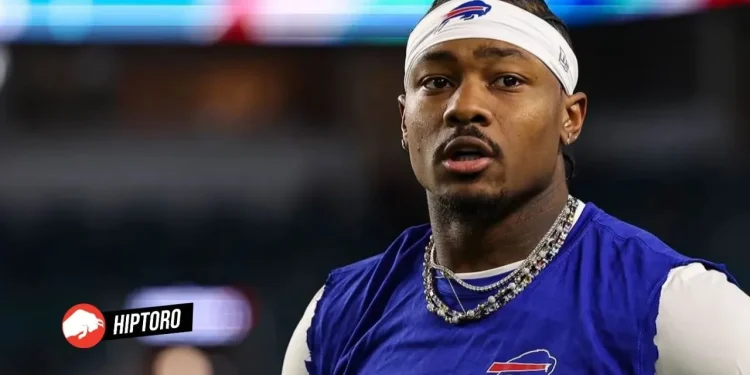In a move that has stirred controversy and speculation, the Buffalo Bills’ recent trade of Stefon Diggs to the Houston Texans has become a focal point for analysis and criticism within NFL circles. As the dust settles, the ramifications of this decision reveal a complex narrative of risk, strategy, and the relentless pursuit of success in the cutthroat arena of professional football.

A Trade That Shook the Buffalo Bills to Their Core
The Buffalo Bills, in an unexpected twist this offseason, decided to part ways with one of their most dynamic and influential players, Stefon Diggs. The trade sent shockwaves through the league, as Diggs, known for his exceptional skills and game-changing plays, was acquired by the Houston Texans “for pennies on the dollar.”
This phrase, often echoed by sports analysts and fans alike, underscores the perceived imbalance in the trade’s value, leaving many to question the Bills’ front office’s strategy.

Buffalo’s decision not only involved the loss of a key offensive weapon but also the addition of a staggering $31 million in dead cap space. This move, characterized as a salary dump, raised eyebrows and concerns regarding the team’s future and its commitment to building a competitive roster around star quarterback Josh Allen.
The Questionable Aftermath for Buffalo Bills
The critique of this trade extends beyond the immediate loss of talent and cap space. It touches on the deeper strategic missteps that could have long-term effects on the Bills’ competitiveness in the AFC. Trading away a player of Diggs’s caliber without a clear, robust plan to enhance the team’s offense has left many fans and experts bewildered.
The absence of a notable return for such a high-caliber player compounds the frustration, drawing criticism from various corners of the sports world.
“It’s unfair to fully judge Buffalo until we know their plan without Diggs. For now, this feels like a salary dump, and one which will negatively impact their franchise quarterback long term,” reflects the prevailing sentiment among those closely watching the Bills’ offseason maneuvers.
“I’d run through the streets of Houston butt ass naked if I’m Stefon Diggs” @ochocinco 🤣💀pic.twitter.com/nfsaKC0E5R
— Houston Stressans (@TexansCommenter) April 5, 2024
Houston Texans Gain and Potential Future Wins With Stefon Diggs
While the trade appears lopsided in favor of the Texans, it also opens up intriguing possibilities for the team. Houston not only secured a proven talent in Diggs but also crafted a deal that could yield additional draft capital should he exit in free agency next offseason. This strategic move demonstrates the Texans’ commitment to leveraging current assets for future gains, highlighting a forward-thinking approach to team building.

The Texans’ receiving corps, already showing promise, is further bolstered by Diggs’s presence. The potential departure of Diggs in 2025 is mitigated by the development of players like Nico Collins and Tank Dell, showcasing Houston’s depth and planning for continuity regardless of individual player movements.
The Unpredictable Nature of NFL Trades
The Stefon Diggs trade saga serves as a stark reminder of the unpredictable and often scrutinized nature of NFL trades. While immediate reactions tend to focus on the surface-level details and perceived winners and losers, the true impact of such moves can only be assessed in the fullness of time.
For the Buffalo Bills, the departure of Diggs marks a significant shift, one whose consequences will unfold in the seasons to come. For the Houston Texans, it’s an opportunity to capitalize on a strategic acquisition, with an eye toward both immediate impact and long-term success.
In the high-stakes world of NFL trades, the balance between risk and reward is ever-present. The Diggs trade exemplifies this delicate dance, leaving fans, analysts, and the teams involved pondering the what-ifs and potential outcomes of one of the offseason’s most talked-about moves.

Source: Fansided









